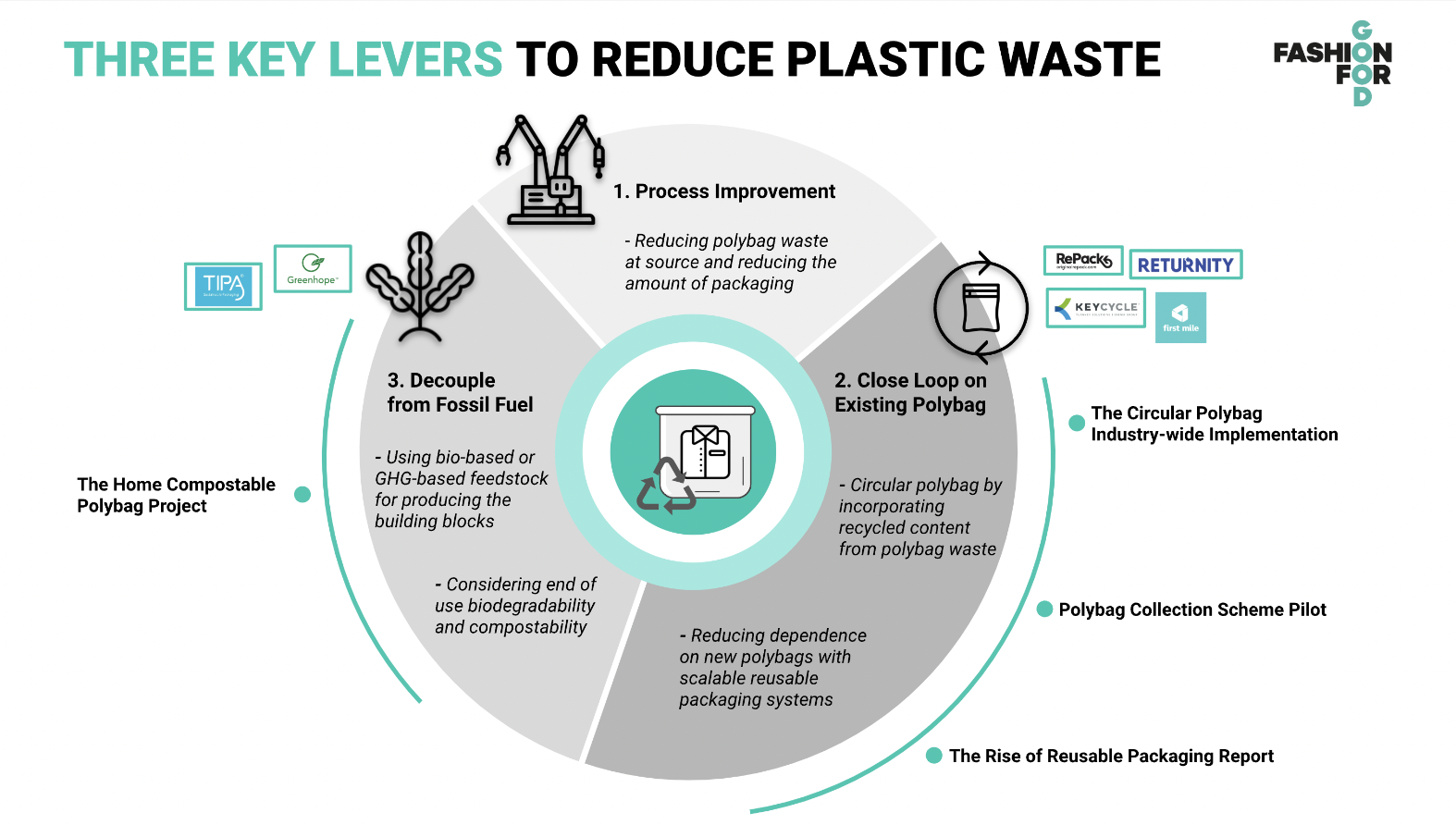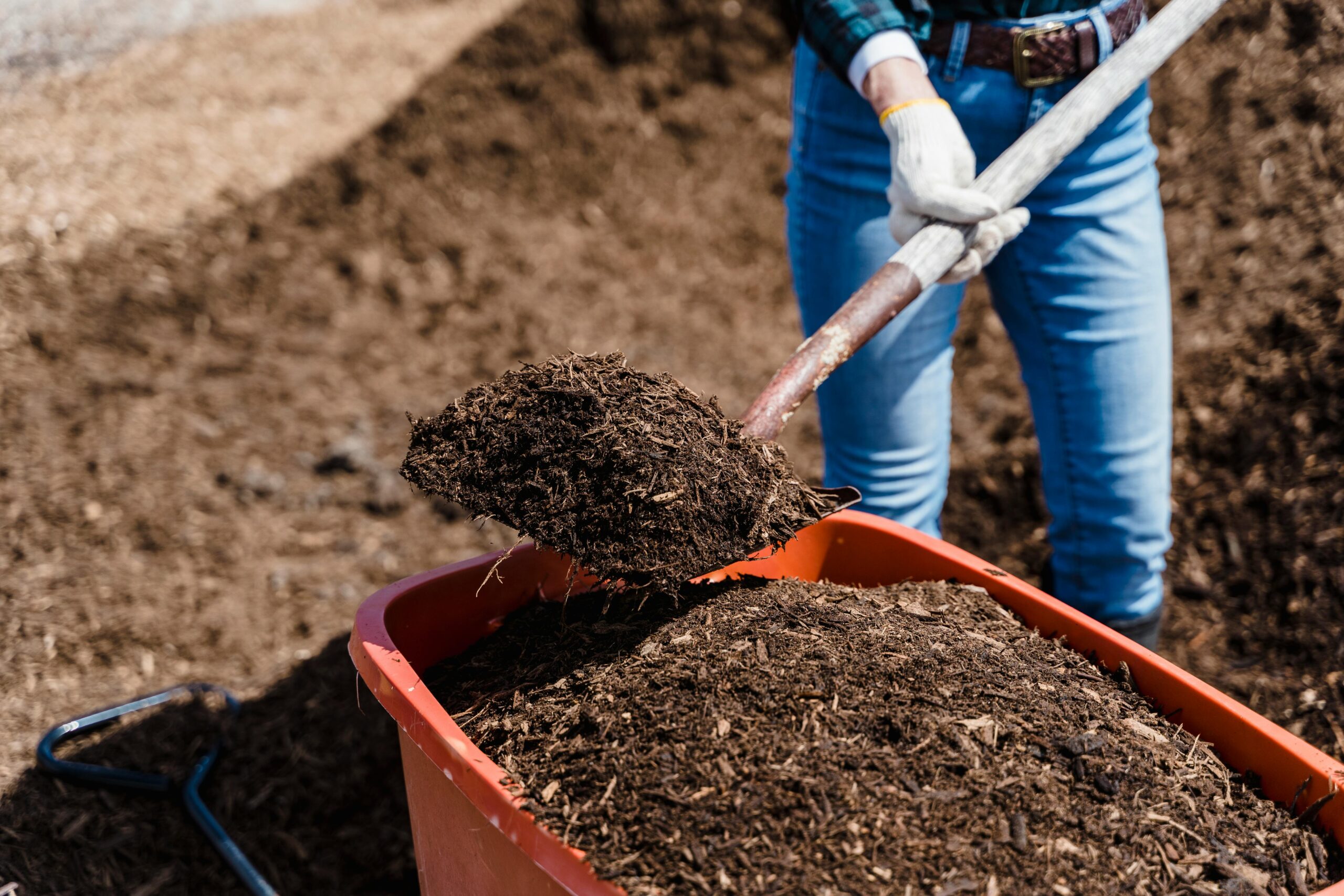
Home-Compostable Polybag Project
The aim of the project was to explore and validate bio-based, home-compostable polybags. To assess their suitability as a sustainable alternative to conventional fossil-fuel-based plastic packaging, addressing the fashion industry’s plastic waste problem.
Problem Statement
Plastic packaging, predominantly fossil-fuel-based, contributes significantly to environmental degradation due to low recycling rates, leakage into natural systems, and high greenhouse gas emissions. Bio-based plastics offer a promising alternative but face challenges such as functionality, cost, and limited infrastructure for collection and disposal.
Executive Summary
Fashion for Good, in collaboration with C&A and Levi Strauss & Co. launched the Home Compostable Polybag Project. This project tested and validated bio-based, home-compostable polybag solutions from TIPA Corp. and Greenhope. The project focused on functionality, environmental impact (including third party compostability assessments), and industry scalability, aiming to reduce plastic waste and environmental damage.
The key findings include the identification of promising solutions that meet functional and environmental criteria, the validation of the material’s natural degradation capabilities, and the establishment of a foundation for future development and adoption. While certain challenges like transparency and durability remain, the project demonstrated promising results for scaling these sustainable alternatives.
Goals of the Project
-
Test the functionality and end-of-use claims of home-compostable polybags.
-
Identify and validate bio-based polybag solutions that are home-compostable.
-
Assess the environmental impact of home-compostable polybags through third-party testing and certifications.
-
-
Project Results
-
Innovative Solutions: The project identified and tested bio-based, home-compostable polybags that meet environmental and functional standards, although further adjustments are needed for fashion industry applications.
-
Environmental Impact: Third-party tests validated the home-compostability of the polybags, demonstrating a significant reduction in the environmental footprint of plastic waste in the fashion industry. TIPA Corp. polybags are certified by TÜV OK Compost Home and Greenhope has been certified by Din Certco Home Compost.
-
Iterative Development: Multiple polybag prototypes were iterated and tested, revealing the need for ongoing refinements to align with industry standards and scaling opportunities.
-
-
Innovation Partner
Implementation Partner
Relevant Resources

Unpacking the Packaging Problem: Solutions and Strategies

Fashion for Good Launches the Home-Compostable Polybag Project

Fashion for Good Launches a Pilot to Produce a Circular Polybag

The Home Compostable Polybag Project

Fashion for Good Expands Polybag Recycling Work
Global sustainability initiative Fashion For Good (FFG) has partnered with UK recycler First Mile to streamline plastic polybag recycling efforts in London, as it expands the outlook of its Plastics Packaging Project.

Fashion for Good launches pilot to make circular polybag
Fashion for Good in partnership with Adidas, C&A, Kering, Otto Group, PVH Corp, and Cadel Deinking, has launched a new pilot project—The Circular Polybag Pilot, which will explore a solution to reduce use and impact of virgin polybags in fashion industry. The pilot is a first in apparel industry to trial a truly circular solution for polybags.

Fashion for Good launches the home-compostable polybag project
Fashion for Good launches the Home-Compostable Polybag Project, a pilot to test alternatives to conventional single-use polybags,

Pilot Project to Tackle Plastic Polybag Waste in Fashion Industry
Recycling company First Mile has partnered with global sustainable fashion innovation platform Fashion for Good on a new pilot scheme that aims to tackle the issue of plastic polybag waste in the fashion industry.
Other Projects

The Next Stride: Bio-based Materials for Footwear Soles
“The Next Stride: Bio-based Materials for Footwear Soles” aims to validate the performance and environmental impact of bio-based polymers as sustainable alternatives to the fossil fuel-derived materials currently used in footwear soles. The objective is to collectively de-risk the transition to these “next-generation” materials by rigorously testing their technical properties and assessing environmental benefits. Ultimately, the purpose is to accelerate the adoption of these bio-based solutions and pave the way for a more sustainable footwear industry.

Beyond50 Denim: Combining Cottonised Hemp And Green Chemistry
“Beyond50 Denim: Combining Cottonised Hemp And Green Chemistry” aims to validate the performance and environmental impact of cottonised hemp processed with green chemistry to act as a true alternative to cotton in denim applications. The project goal is to evaluate the performance of SEFF’s cottonised hemp fibre in combination with Fibre52’s bio-friendly chemistry solution within denim fabric applications with a total hemp content of 50% and above. The fabrics will be benchmarked against conventional 100% cotton denim with a specific focus on handfeel and aesthetic characteristics.

Price Parity Toolkit
The Price Parity Toolkit (PPT) was designed to help bridge the price gap between next-gen* and conventional materials. Developed by Fashion for Good with the support of Canopy, this industry-supported framework introduces a financing mechanism that decouples price premiums at early stages of the supply chain to enable adoption and drive the scale of lower-impact materials.




